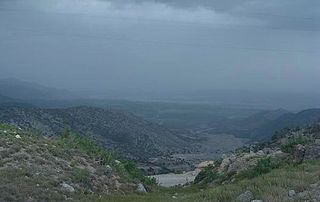Waziristan is a mountainous region covering the former FATA agencies of North Waziristan and South Waziristan which are now districts of Khyber Pakhtunkhwa province of Pakistan. Waziristan covers some 11,585 square kilometres (4,500 sq mi). The area is populated by ethnic Pashtuns. It is named after the Wazir tribe. The language spoken in the valley is Pashto, predominantly the Waziri dialect. The region forms the southern part of Pakistan's Federally Administered Tribal Areas, which is now part of Khyber Pakhtunkhwa province. The 16th-century Pashtun revolutionary leader and warrior-poet Bayazid Pir Roshan, who wrote the oldest known book in Pashto, was based in Kaniguram, Waziristan.

Parachinar is a small Pashtun town which is the capital of Kurram District in the province of Khyber Pakhtunkhwa, Pakistan.

Orakzai District is a district in Kohat Division of Khyber Pakhtunkhwa province in Pakistan. Until 2018, it was an agency of Federally Administered Tribal Areas. With the merger of FATA with Khyber Pakhtunkhwa, it became a district. Before to 1973, it was part of FR Kohat.

The Turi or Torai are a tribe of the Pashtun people, inhabiting the Kurram Valley, in Kurram Agency in the Federally Administered Tribal Areas of Pakistan, with a smaller number living across the Durand line in the Paktia province of Afghanistan. They speak Pashto and are adherents of the Twelver Shia sect of Islam. Unlike the majority of Pashtun tribes, The Turis predominantly follow the Shia sect of Islam, because of this and other reasons and land history they are usually tensions between them and the Sunni Pashtun tribes; Mangal and Bangash tribe who also live in Kurram Valley.

Khyber District is a district in Peshawar Division of Khyber Pakhtunkhwa province in Pakistan. Until 2018, it was an agency of the Federally Administered Tribal Areas; with the merger of FATA with Khyber Pakhtunkhwa, it became a district. It ranges from the Tirah valley down to Peshawar. It borders Nangarhar Province to the west, Orakzai District to the south, Kurram District to south west, Peshawar to the east and Mohmand District to the north.

Kurram District is a district in Kohat Division of Khyber Pakhtunkhwa province in Pakistan.The name Kurram comes from the river Kuramá in Pashto which itself derives from the Sanskrit name Krumuḥ.
The Kurram Agency War began on 6 April 2007 in Kurram Agency, Federally Administered Tribal Areas, Pakistan when a Sunni gunman on a Friday prayer held by Shia in Parachinar. It left more than 40 people dead and more than 150 people wounded . Tension had been brewing in the area adjacent to the Afghan border since April 1 when the sectarian group Ahl-e-Sunnat Wal Jamaat taking part in Mawlid when some of Sunni people having guns shot the Shia people.

The insurgency in Khyber Pakhtunkhwa, also known as the War in North-West Pakistan or Pakistan's war on terror, is an ongoing armed conflict involving Pakistan, and Islamist militant groups such as the Tehrik-i-Taliban Pakistan (TTP), Jundallah, Lashkar-e-Islam (LeI), TNSM, al-Qaeda, and their Central Asian allies such as the ISIL–Khorasan (ISIL), Islamic Movement of Uzbekistan, East Turkistan Movement, Emirate of Caucasus, and elements of organized crime. Formerly a war, it is now a low-level insurgency as of 2017.

The Orakzai and Kurram offensive, also known as Operation Khwakh Ba De Sham was a Pakistani military operation against the Tehrik-i-Taliban in the Orakzai Agency and Kurram Agency area of the Federally Administered Tribal Areas that began on 23 March 2010. It was part of the War in North-West Pakistan.
Events from the year 2010 in Pakistan.
On 9 July 2010, a suicide bombing occurred in a market in Yakaghund, Mohmand Agency, in the Federally Administered Tribal Areas of Pakistan. At least 104 people were killed while more than 120 people were wounded. This was the last of a streak of attacks that was the record most major terrorist attacks in a row in the Pakistan war on terrorism, with least 7 in a row, much more than the previous record of 2 which happened only 2 times; marking an escalating of the War on Terrorism in Pakistan.
These are the list of Terrorist attacks in Pakistan in 2010.
In 2008, Pakistan saw 40 terrorist attacks, which caused 154 fatalities and 256 injuries.
This is a list of terrorist incidents in Pakistan in 2012. Pakistan has faced numerous attacks by insurgents as a result of the ongoing War in North-West Pakistan by the Pakistani military against militant groups, part of the War on Terror. At the same time, there have also been numerous drone attacks in Pakistan carried out by the United States which exclusively target members of militant groups along the Afghan border regions.
This is a list of terrorist incidents in Pakistan in 2013. Some of the incidents are sectarian in nature and the TTP is responsible for a majority of them.

Operation Zarb-e-Azb was a joint military offensive conducted by the Pakistan Armed Forces against various militant groups, including the Tehrik-i-Taliban Pakistan (TTP), the Islamic Movement of Uzbekistan, the East Turkestan Islamic Movement, Lashkar-e-Jhangvi, al-Qaeda, Jundallah and Lashkar-e-Islam. The operation was launched on 15 June 2014 in North Waziristan along the Pakistan-Afghanistan border as a renewed effort against militancy in the wake of the 8 June attack on Jinnah International Airport in Karachi, for which the TTP and the IMU claimed responsibility. As of 14 July 2014, the operation internally displaced about 929,859 people belonging to 80,302 families from North Waziristan.

Khyber was the code-name for a 2014–2017 military offensive conducted by Pakistan's military in the Khyber Agency in four phases; Khyber-1, Khyber-2, Khyber-3 and Khyber-4.

The Kurram Militia is a paramilitary regiment of the Frontier Corps of Pakistan. It was originally raised by the British in 1892 to operate in the North-West Frontier Province, and carried in that role following Pakistan's independence in 1947.
This article is a chronological outline of terrorist incidents in Pakistan in 2018.










